- Home
- Albert Camus
The First Man Page 2
The First Man Read online
Page 2
"I'm the new manager of the Saint-Apotre property. My wife is giving birth. I need help."
No one answered. After a moment bolts were drawn, bars were lifted, then dragged away, and the door opened partway. He could make out the black curly head of a European woman with plump cheeks and a flattish nose above full lips. "My name is Henri Cor-mery. Can you go to be with my wife? I'm going to get the doctor."
She gazed at him with the eye of one accustomed to weighing men and misfortune. He met her look squarely, but without adding a word of explanation. "I'll go," she said. "You hurry."
He thanked her and kicked the horse with his heels.
A few moments later he entered the village by passing between rampart-like walls made of dried mud. Stretching before him lay what seemed to be the only street, bordered with small one-story houses, all alike; he followed it to a small hard-surfaced square where, surprisingly, he found a metal-framed bandstand. The square, like the street, was deserted. Cormery was already headed toward one of the houses when the horse shied. An Arab, in a torn somber-colored burnoose, appeared from the shadows and came toward him. "The doctor's house," Cormery immediately asked. The Arab studied the horseman. "Come," he said after he had looked him over. They went back up the street. Written on a building with a raised ground floor reached by whitewashed stairs were the words: "Liberte, Egalite, Fraternite." Next to it was a small garden surrounded by roughly finished walls; at its far end was a house, to which the Arab pointed. "That's it," he said. Cormery jumped down from the horse, and, at a pace that showed no sign of fatigue, he crossed the garden, where all he noticed was, at the exact center, a dwarf palm with withered leaves and a rotted trunk. He knocked at the door. No one answered.a He turned around. The Arab was waiting in silence. The husband knocked again. From inside could be heard footsteps that stopped behind the door. But the door did not open. Cormery knocked again and said, "I'm looking for the doctor."
a. I fought against the Moroccans (with a cryptic look) Moroc-cans, they're no good.
At once the bolts were drawn and the door was opened. A man appeared. His face was young and chubby, but his hair was almost white. He was tall and well built, and his legs were squeezed into leggings. He was putting on a sort of hunting jacket. "Well! Where did you come from? I've never seen you before," he said, smiling. The husband explained. "Oh yes, the mayor told me. But, you know, this is a strange place to come to have a baby." The husband said he had been expecting the event later and that he must have made a mistake. "Well, that happens to everyone. Go ahead, I'll saddle Matador and follow you."
Halfway back, and through the rain that had begun to fall again, the doctor, mounted on a dappled gray horse, caught up with Cormery, who was now soaked through but still erect on his heavy farm horse. "Strange way to arrive," the doctor called out. "But you'll see, there's good in this place, not counting the mosquitoes and the bandits in the bush." He stayed alongside his companion. "About the mosquitoes, you know, you don't have to worry till spring. As for the bandits ..." He laughed, but the husband rode on without a word. The doctor looked at him with curiosity. "Have no fear," he said, "it will all go well."
Cormery turned his straightforward gaze on the doctor, and, looking calmly at him, said with a touch of warmth: "I'm not afraid. I'm used to hard knocks."
"Is this your first?"
"No, I left a four-year-old boy in Algiers with my mother-in-law."
They came to the crossroads and took the road to the
property. Soon the cinders were flying under the horses' hooves. When the horses stopped and silence fell once more, they heard a loud cry from the house. The two men dismounted.
Awaiting them was a shadowy figure sheltered under a vine that was dripping water. Drawing closer, they recognized the old Arab wearing an improvised hood made of a sack. "Greetings, Kaddour," said the doctor. "How is it going?"
"I don't know, I especially don't go in where the women are," the old man said.
"Good rule," said the doctor. "Particularly when women are crying." But no cries were coming now from inside. The doctor opened the door and went in, Cormery behind him.
In front of them a big fire of vine branches flaming in the fireplace lighted the room more than did the kerosene lamp, with copper and bead trim, that hung from the middle of the ceiling. To their right, the sink was now all covered with towels and metal pitchers. The table in the middle of the room had been pushed over to the left, in front of a rickety sideboard made of unfinished wood. On it were an old traveling bag, a hatbox, and various bundles. Pieces of old luggage, including a big wicker trunk, filled all the corners of the room, leaving a space only in the middle, not far from the fire. In that space, on a mattress set at right angles to the fireplace, the wife lay stretched out, head laid back on a pillow without a case, her hair let down. The blankets now covered only half the mattress. The uncovered part of the mattress was hidden from sight by the owner of the
canteen, who was on her knees to its left. She was wringing out, over a washbasin, a towel dripping reddish drops of water. To the right, sitting cross-legged, an unveiled Arab woman held out, as if making an offertory, a second, somewhat flaking enamel basin full of steaming hot water. The two women were on either side of a folded sheet that lay under the wife. The shadow and light of the fireplace rose and fell on the whitewashed walls, on the baggage that cluttered the room, and, still closer, glowed red on the faces of the two nurses and on the form of the wife, bundled up under the blankets.
When the two men entered, the Arab woman glanced quickly at them, gave a brief laugh, then turned to the fire, her thin brown arms still offering the washbasin. The owner of the canteen looked at them and joyfully exclaimed: "No more need for you, Doctor. It happened by itself." She got to her feet and the two men saw, near the patient, something shapeless and bloody stirring with a sort of still movement and making a continuing, barely perceptible sound like a muffled screeching.a
"So they say," said the doctor. "I hope you haven't touched the cord."
"No," said the woman, laughing. "We had to leave you something to do."
She got up and gave her place to the doctor, who again blocked the newborn from the sight of Cormery,
a. like that of certain cells under the microscope.
still at the door, his head uncovered. The doctor squatted and opened his case; then he took the basin from the hands of the Arab woman, who immediately withdrew from the circle of light and took refuge in the dark angle of the fireplace. The doctor washed his hands, his back still to the door, then poured on those hands some alcohol that smelled a bit like grape liquor; its odor at once filled the room. At that moment, the wife lifted her head and saw her husband. A marvelous smile transfigured that exhausted beautiful face. Cormery went over to the mattress. "He came," she said under her breath, and she reached out her hand to the infant.
"Yes," said the doctor. "But stay still." The wife gave him a questioning look.
Cormery, standing at the foot of the mattress, made a quieting gesture. "Lie down."
She lay back down again. The rain began to come down twice as hard on the old tile roof. The doctor went to work under the blanket. Then he straightened up and seemed to shake something in front of him. A small cry was heard. "It's a boy," the doctor said. "And a good sturdy one."
"There's one who's getting off to a good start," said the owner of the canteen. "By moving to a new home."
The Arab woman in the corner laughed and clapped her hands twice. Cormery glanced at her and she turned away, embarrassed.
"All right," said the doctor. "Now leave us for a moment."
Cormery looked at his wife. But her face was still tilted back. Her hands, lying relaxed on the coarse blan-
ket, were all there was to remind him of the smile that a while ago had filled and transfigured that wretched room. He put on his helmet and headed toward the door.
"What are you going to name him?" the owner of the canteen called out.
; "I don't know, we haven't thought about it." He looked at her. "Since you were here, we'll call him Jacques."
The woman burst out laughing and Cormery went out. The Arab, his head still covered with the sack, was waiting under the vine. He looked at Cormery, who said nothing to him. "Here," said the Arab, and held out an end of the sack.
Cormery took shelter. He could feel the shoulder of the old Arab against him, and he smelled the smoke given off by his clothes; he felt the rain falling on the sack over their two heads. "It's a boy," he said without looking at his companion.
"God be praised," answered the Arab. "You are a chief." The water that had come from thousands of kilometers away went on falling before them, on the cinders and the many puddles that pitted them, on the vineyards farther distant, and the trellis wires still gleamed under the raindrops. It would never get to the sea to the East, and now it was going to drench the whole country, the marshy land by the river and the mountains around them, the immense almost uninhabited territory whose powerful odor reached the two men huddled under the one sack, while behind them a feeble cry resumed from time to time.
Late in the night, Cormery was lying stretched out, in long drawers and undershirt, on a second mattress by his wife, watching the flames dance on the ceiling. The room was now pretty well tidied. On the other side of his wife, in a laundry basket, the infant slept in silence except for an occasional weak gurgle. His wife was also sleeping, her face turned toward him, her mouth partly open. The rain had stopped. Tomorrow he would have to start work. Near him, his wife's hand, already so worn it almost seemed made of wood, also reminded him of work. He reached out his own hand, placed it gently on hers, and, laying his head back, closed his eyes.
Saint-Brieuc
aForty years later a man standing in the corridor of the Saint-Brieuc train was watching with an air of disapproval as the villages and ugly houses of the flat cramped countryside that stretches from Paris to the Channel marched past under the pale sun of an afternoon in spring. The meadows and fields of a land that for centuries had been cultivated to the last square meter passed, in turn, before him. With bare head and hair cut short, long face and delicate features, a direct gaze in his blue eyes, the man was of medium height, and despite his forty years he still looked slender in his raincoat. He stood with his hands firmly placed on the railing; leaning his weight on one hip, his torso at ease, he gave the impression of competence and vigor. Then the train slowed and finally stopped in a small shabby station. A moment later a rather elegant young woman passed by the window where the man was standing. She stopped
a. From the beginning, should show the alien in Jacques more.
to shift her suitcase from one hand to the other, and just then she noticed the traveler. He looked at her smiling, and she could not help smiling also. The man lowered the window, but the train was already leaving. "Too bad," he said. The young woman was still smiling at him.
The traveler went to sit down in his third-class compartment, where he had a seat by the window. A man with sparse plastered hair—not as old as his swollen, blotchy face suggested—was sitting huddled across from him; his eyes were closed and he was breathing hard, obviously disturbed by his labored digestion. He cast an occasional quick* glance at the traveler. On the same seat, by the corridor, a peasant woman in her Sunday best, crowned by a peculiar hat adorned with a bunch of wax grapes, was blowing the nose of a redheaded child whose face looked dim and faded. The traveler's smile disappeared. He took a magazine from his pocket and absently read an article that made him yawn.
A bit later the train stopped, and a small placard announcing "Saint-Brieuc" moved slowly into the frame of the window. The traveler immediately stood up, effortlessly lifted his suitcase with its expanding sides from the overhead rack, and, after nodding to his fellow travelers, who responded with seeming surprise, he left rapidly and hurried down the three steps of the car. On the platform, he looked at his left hand, dirty from the
* dim
soot that had accumulated on the railing he had just been holding, took out a handkerchief and carefully wiped it off. Then he headed toward the exit, where he was gradually joined by a group of somberly dressed travelers with blotchy faces. Under the shelter with its small posts he patiently waited his turn to hand over his ticket, waited again till the taciturn clerk returned it to him, crossed a waiting room with bare dirty walls, decorated only with old posters in which even the Riviera had taken on the colors of soot, and, striding at a lively pace through the slanting afternoon light, he went down the street that led from the station to the town.
At the hotel he asked for the room he had reserved, refused the help of the potato-faced chambermaid who wanted to carry his bag, and, after she had shown him to his room, gave her nonetheless a tip that surprised her and brought a friendly look to her features. Then he washed his hands again, and went back downstairs, still at a lively pace, without locking his door. He found the chambermaid in the lobby, asked her where the cemetery was, was given too much explanation, listened amiably, then set out in the direction she had indicated. Now he was walking down streets that were narrow and depressing, bordered by commonplace houses with ugly red tiles. Here and there he could see the crooked slates of an old half-timbered house. The few passersby did not even stop before the shopwindows that displayed the glass products, the masterpieces in plastic and nylon, the wretched ceramics that are found in every town in the contemporary Western world. Only the food shops showed any opulence. High forbidding walls sur-
rounded the cemetery. Near its gate, meager displays of flowers and marble-cutters' shops. The traveler stopped in front of one of these shops to watch a bright-looking child in a corner who was doing his homework on a marble slab that had yet to be inscribed. Then he entered the cemetery and went to the caretaker's house. The caretaker was not there. The traveler waited in the barely furnished little office, then noticed a map, which he was studying when the caretaker entered. He was a tall gnarled man, with a big nose, who smelled of the sweat under his thick high-necked jacket. The traveler asked for the location of those who died in the war of 1914.
"Yes," the caretaker said. "That's called the square of French Remembrance. What name are you looking for?"
"Henri Cormery," said the traveler.
The caretaker opened a large book bound in wrapping paper and went down a list of names with his dirty finger. His finger came to a stop. "Cormery Henri," he said, "fatally wounded at the Battle of the Marne, died at Saint-Brieuc October 11, 1914."
"That's it," said the traveler.
The caretaker closed the book. "Come," he said. And he led the way to the first row of gravestones, some of them simple, others ugly and pretentious, all covered with that bead and marble bric-a-brac that would disgrace anyplace on earth. "Was he related to you?" he asked absently.
"He was my father."
"That's rough," the other man said.
"No, it isn't. I was less than a year old when he died. So, you see."
"Yes," said the caretaker, "but even so. Too many died."
Jacques Cormery did not answer. Surely, too many had died, but, as to his father, he could not muster a filial devotion he did not feel. For all these years he had been living in France, he had promised himself to do what his mother, who stayed in Algeria, what she1 for such a long time had been asking him to do: visit the grave of his father that she herself had never seen. He thought this visit made no sense, first of all for himself, who had never known his father, who knew next to nothing of what he had been, and who loathed conventional gestures and behavior; and then for his mother, who never spoke of the dead man and could picture nothing of what he was going to see. But since his old mentor had retired to Saint-Brieuc and so he would have an opportunity to see him again, Cormery had made up his mind to go visit this dead stranger, and had even insisted on doing it before joining his old friend so that afterwards he would feel completely free.
"It's here," said the caretaker. They had arrived
at a square-shaped area enclosed by small markers of gray stone connected with a heavy chain that had been painted black. The gravestones—and they were many—were all alike: plain inscribed rectangles set at equal intervals row on row. Each grave was decorated
1. sic
with a small bouquet of fresh flowers. "For forty years the French Remembrance has been responsible for the upkeep. Look, here he is." He indicated a stone in the first row. Jacques Cormery stopped at some distance from the grave. "I'll leave you," the caretaker said.
Cormery approached the stone and gazed vacantly at it. Yes, that was indeed his name. He looked up. Small white and gray clouds were passing slowly across the sky, which was paler now, and from it fell a light that was alternately bright and overcast. Around him, in the vast field of the dead, silence reigned. Nothing but a muffled murmur from the town came over the high walls. Occasionally a black silhouette would pass among the distant graves. Jacques Cormery, gazing up at the slow navigation of the clouds across the sky, was trying to discern, beyond the odor of damp flowers, the salty smell just then coming from the distant motionless sea when the clink of a bucket against the marble of a tombstone drew him from his reverie. At that moment he read on the tomb the date of his father's birth, which he now discovered he had not known. Then he read the two dates, "1885—1914," and automatically did the arithmetic: twenty-nine years. Suddenly he was struck by an idea that shook his very being. He was forty years old. The man buried under that slab, who had been his father, was younger than he.a

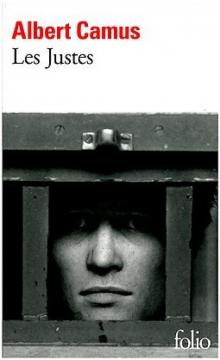 Les Justes
Les Justes The Sea Close By
The Sea Close By The Stranger
The Stranger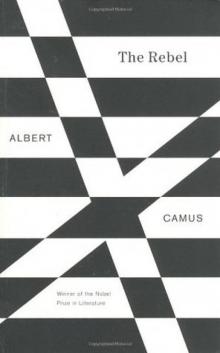 The Rebel: An Essay on Man in Revolt
The Rebel: An Essay on Man in Revolt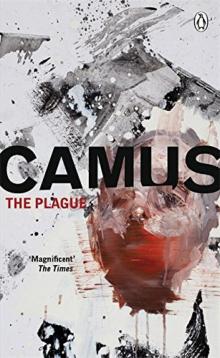 The plague
The plague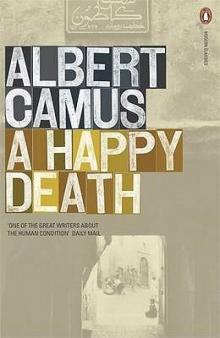 A Happy Death
A Happy Death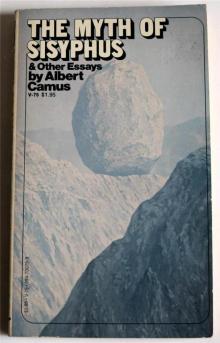 The Myth of Sisyphus and Other Essays
The Myth of Sisyphus and Other Essays The Fall
The Fall Resistance, Rebellion, and Death
Resistance, Rebellion, and Death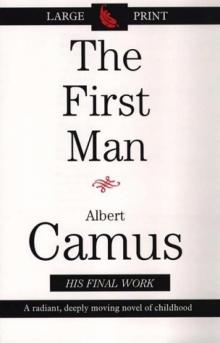 The First Man
The First Man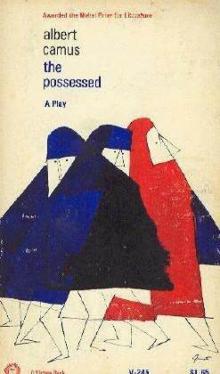 The Possessed
The Possessed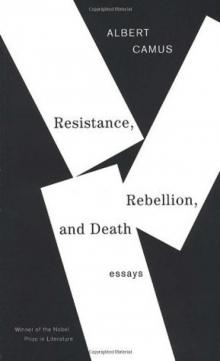 Resistance, Rebellion and Death: Essays
Resistance, Rebellion and Death: Essays